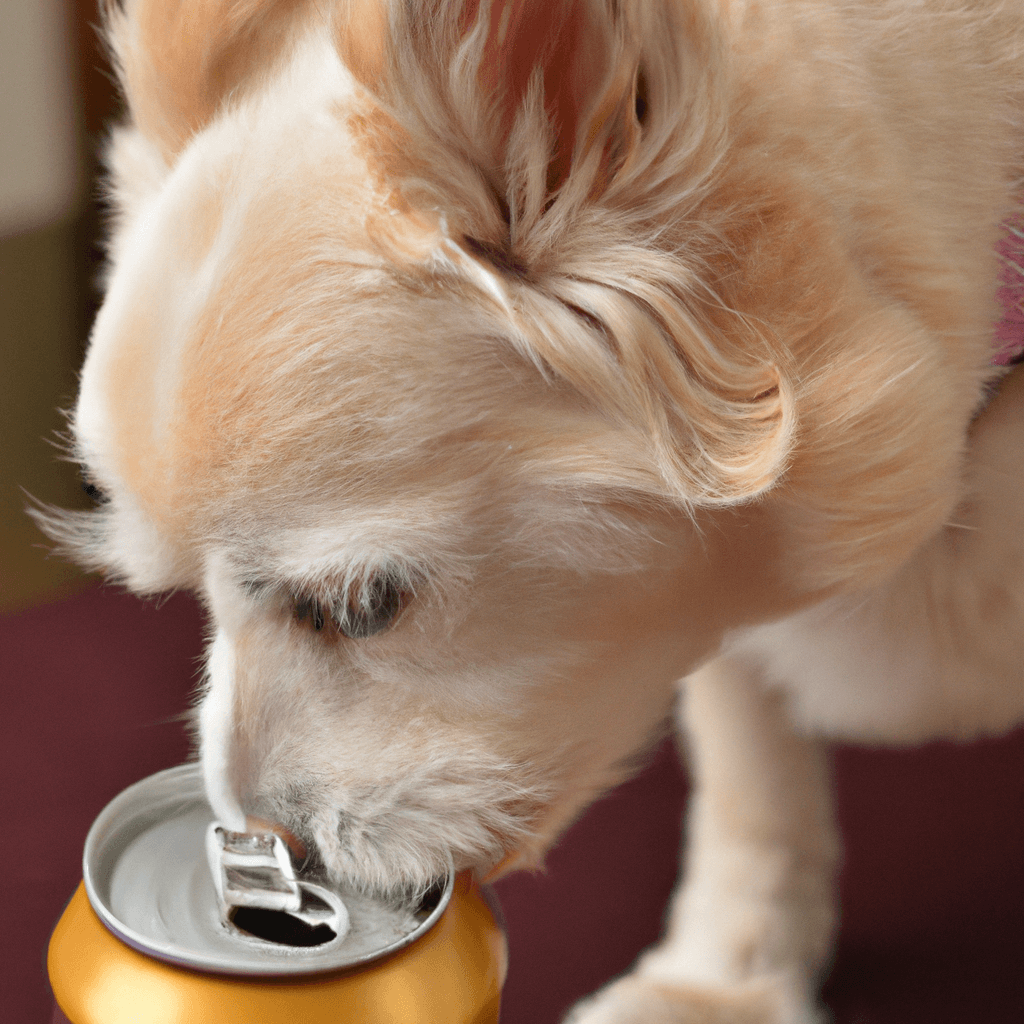Ginger ale is a popular carbonated beverage that is enjoyed by people of all ages. While it may seem like an innocent and harmless beverage, is it safe for dogs to drink? The answer is yes, but you should use caution, as there are certain risks associated with giving ginger ale to your pup. In this article, we’ll explore the potential benefits and risks of giving your dog ginger ale, as well as tips on how to serve it safely.
The Benefits and Risks of Giving Your Dog Ginger Ale
A ginger ale can be a great way to treat your pup to a tasty snack and even help settle their stomachs, but it is important to be aware of the benefits and risks that come with giving your canine companion ginger ale. Benefits Ginger ale can be a great way to treat your furry friend. Not only is it a tasty treat, but ginger has many health benefits as well. Ginger is thought to have anti-inflammatory properties, as well as being beneficial for aiding digestion, reducing nausea and vomiting, and even providing relief from arthritis. If your pup is feeling a bit queasy, ginger ale may be able to provide some relief.
Risks Though ginger ale may have some positive effects, it is important to keep in mind that it is not an appropriate replacement for water. Though it can be used in moderation, too much ginger ale can lead to dehydration and an imbalance of electrolytes in your pup’s body. Additionally, ginger ale contains a lot of sugar and calories, which can lead to obesity and other health issues if consumed in large amounts. It is important to ensure that your pup does not consume too much of the beverage.
Overall, ginger ale is a great treat for your pup, but it should be used in moderation and only as a snack. If you are concerned about your pup’s health, it is always best to consult with your veterinarian before introducing any new food or beverage into their diet.
Is Ginger Ale an Appropriate Drink for Your Dog?
No, ginger ale is not an appropriate drink for your dog. While this carbonated beverage may be a refreshing treat for people, it’s not the best choice for dogs. The sugar content and artificial sweeteners in ginger ale can upset your pup’s stomach and can even lead to obesity. It’s best to stick to plain water to keep them hydrated and healthy.
What to Know Before Letting Your Dog Drink Ginger Ale
Letting your dog drink ginger ale can be a great way to soothe an upset stomach, but there are some things to know before giving your pup this bubbly beverage. First and foremost, make sure that the ginger ale you give your dog is caffeine-free. Caffeine can be toxic to dogs, even in small doses, so it is important to make sure the ginger ale is caffeine-free before giving it to your pup.
You should also use moderation when giving your pup ginger ale. Too much of it can cause an upset stomach, just like it would in people. Also, since ginger ale is high in sugar, it’s best to give it sparingly as a treat, not as a replacement for regular water. Finally, if your pup’s upset stomach persists, it’s best to consult a vet. While ginger ale can be a great way to soothe an occasional upset stomach, it may not fix serious digestive issues. A vet can help you determine the cause and the best course of action.
How to Safely Give Your Dog Ginger Ale
Giving your dog ginger ale can be a great way to help them settle their stomach and feel better. But before you do, it’s important to make sure you’re doing it safely. Here’s how to give your pup ginger ale the right way: 1. Make sure it’s a safe brand of ginger ale: Not all ginger ale is created equal! Look for a brand that doesn’t contain a lot of added sugar or artificial sweeteners, and check the label to make sure it’s caffeine-free. 2. Dilute it: Ginger ale on its own can be too strong for a pup’s delicate stomach, so it’s best to dilute it with water. Start with a 1:4 ratio of ginger ale to water, and adjust as needed. 3. Offer it in small amounts: Start by offering your pup a teaspoon of the diluted ginger ale and see how they react.
If they seem to tolerate it, you can increase the amount as needed. 4. Give it to them slowly: Put a small amount of the diluted ginger ale in a syringe or dropper and offer it to your pup slowly over several minutes. This will help them digest it better. 5. Keep an eye out for any signs of distress: As with any new food or drink, it’s important to keep an eye on your pup to make sure they’re not having any negative reactions.
If they seem to be getting worse, stop giving them the ginger ale and consult your vet right away. With these tips, you can give your pup ginger ale in a safe and effective way. Just remember to always start with small amounts and watch for any signs of distress. If your pup tolerates it well, ginger ale can be a great way to help soothe their upset stomach.
The Pros and Cons of Feeding Your Dog Ginger Ale
Feeding your dog ginger ale is an age-old remedy for an upset stomach, but is it really safe for your pup? Here are the pros and cons of feeding your dog ginger ale. Pros: – Ginger ale contains ginger, which is thought to help reduce nausea, bloating, and gas in humans. It’s possible that the same could be true for dogs.
-Ginger ale is generally made with natural ingredients, so it’s not as processed as other sodas and doesn’t contain any artificial sweeteners. – Ginger ale is low in sugar, so it’s not as bad for your pup as other sodas. Cons: – Ginger ale is carbonated, and can cause excessive gas in your pup, which could worsen an upset stomach. – Dogs are sensitive to sugar, and even though ginger ale is low in sugar, it still contains some.
Too much sugar can lead to diabetes and obesity. – Ginger ale can be high in sodium, which can lead to dehydration and digestive issues in dogs. As with any human food, it’s important to consult your vet before giving your pup ginger ale. If your pup does have an upset stomach, make sure to monitor them for any adverse reactions after drinking ginger ale.
How Much Ginger Ale is Safe for Dogs to Drink?
It’s generally not recommended to give dogs ginger ale or any other type of soda. Sugary drinks can be bad for your pup’s health and can even cause serious health issues like diabetes. Even if it’s diet ginger ale, it still contains some artificial sweeteners that can be harmful to your dog. If your pup does get his paws on some ginger ale, it’s typically safe for them to have a very small amount occasionally.
But you should always check with your vet to make sure it won’t cause any health problems. Too much ginger ale can cause stomach upset, dehydration, and even pancreatitis, so it’s best to avoid giving it to your pup altogether.
Is Ginger Ale Good for Dogs?
No, ginger ale is not good for dogs! While it may seem harmless to give your pup a bit of your favorite beverage, it can actually cause harm to them. Ginger ale contains high amounts of sugar that can be dangerous to your pup’s health. It can also cause an upset stomach due to its carbonation. So, while it’s tempting to give your pup a taste of your ginger ale, it’s best to avoid it altogether.
Natural Alternatives to Ginger Ale for Dogs
If your pup needs a tasty alternative to the classic ginger ale, fear not, there are plenty of natural options to choose from. Here are some ideas to get you started: 1. Coconut Water: Coconut water is packed with electrolytes, minerals, and vitamins, making it a great alternative to ginger ale. Plus, it has a delicious, refreshing taste that dogs love. 2. Bone Broth: Another great option is bone broth.
It’s full of nutrients and flavor, and it’s easy to make at home. 3. Infused Water: Infusing water with fruits and herbs is a great way to add flavor and nutrients to your pup’s water. Try adding a few slices of cucumber, lemon, or mint to a bowl of water for a tasty, refreshing alternative to ginger ale. 4. Kombucha: Kombucha is a fermented beverage made from tea and sugar.
It’s full of probiotics, which can help support your pup’s digestive health. 5. Green Juice: Green juices are a great source of vitamins and minerals, and many dogs love the flavor. Just make sure to use organic, unsweetened juices with no added sugar. No matter which option you choose, make sure you offer your pup plenty of fresh water throughout the day as well.
Tips for Giving Your Dog Ginger Ale
1. Make sure the ginger ale you are giving to your dog is caffeine-free. Caffeine can be harmful to dogs and can cause serious medical problems. 2. Use ginger ale as a treat, not as a meal replacement. Dogs should always have a balanced, nutritious diet, and ginger ale should be offered in moderation. 3. Check the ingredients list on the ginger ale bottle before giving it to your pup.
Avoid any ginger ale that contains added sugar, artificial sweeteners, or other additives that could potentially be harmful to your pet. 4. Don’t give ginger ale to puppies or dogs that are very young or very old. These dogs have a weaker digestive system, so the carbonation in the ginger ale could cause them discomfort. 5. Make sure to always offer your pup plenty of clean, fresh water.
Drinking ginger ale should not replace your pet’s regular water intake. 6. If your dog starts to show signs of discomfort after drinking ginger ale, stop giving it to them and consult with your veterinarian.
Is Ginger Ale the Right Drink for Your Dog?
No, ginger ale is not the right drink for your dog! Dogs need to stay hydrated, just like humans, but plain water is the best choice for them. Dogs don’t need the added sugar or other sweeteners that are in ginger ale. Too much sugar can lead to weight gain and other health issues for your pup. Plus, ginger ale might not be easy for your dog to digest. The carbonation and other ingredients in the drink can upset your dog’s stomach and lead to vomiting or diarrhea. So it’s best to just keep it away from your pup and give them plain water instead.
In conclusion, it is generally not recommended for dogs to drink ginger ale. As with any human food, it is best to consult a veterinarian before giving it to a pet. While some dogs may tolerate small amounts of ginger ale without any problems, the potential risks associated with ingesting the carbonated beverage and the high levels of sugar and sodium it contains may make it unsafe for some dogs.




